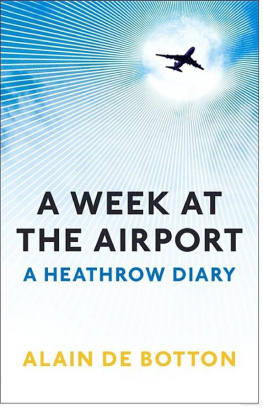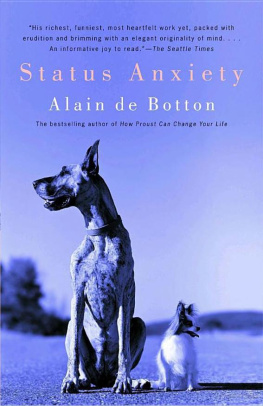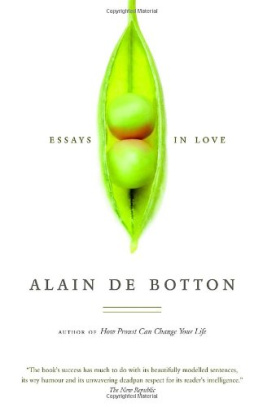Alain de Botton
A Week at the Airport
A Heathrow Diary
Alain de Botton is the author of three works of fiction and eight works of non fiction, including How Proust Can Change Your Life, The Consolations of Philosophy, and The Art of Travel. He lives in London, where he founded The School of Life (www.theschooloflife.com).
www.alaindebotton.com
ALSO BY ALAIN DE BOTTON
Essays in Love - How Proust Can Change Your Life - The Pleasures and Sorrows of Work - The Art of Travel - Status Anxiety - The Architecture of Happiness - The Consolations of Philosophy
A VINTAGE INTERNATIONAL ORIGINAL, SEPTEMBER 2010
Copyright 2009 by Alain de Botton
Photographs copyright 2009 by Richard Baker All rights reserved. Published in the United States by Vintage Books, a division of Random House, Inc., New York. Originally published in Great Britain by Profile Books Ltd, London, in 2009.
eISBN: 978-0-307-74269-8
For Saul
While punctuality lies at the heart of what we typically understand by a good trip, I have often longed for my plane to be delayed so that I might be forced to spend a bit more time at the airport. I have rarely shared this aspiration with other people, but in private I have hoped for a hydraulic leak from the undercarriage or a tempest off the Bay of Biscay, a bank of fog in Malpensa or a wildcat strike in the control tower in Mlaga (famed in the industry as much for its hot-headed labour relations as for its even-handed command of much of western Mediterranean airspace). On occasion, I have even wished for a delay so severe that I would be offered a meal voucher or, more dramatically, a night at an airlines expense in a giant concrete Kleenex box with unopenable windows, corridors decorated with nostalgic images of propeller planes and foam pillows infused with the distant smells of kerosene.
In the summer of 2009, I received a call from a man who worked for a company that owned airports. It held the keys to Southampton, Aberdeen, Heathrow and Naples, and oversaw the retail operations at Boston Logan and Pittsburgh International. The corporation additionally controlled large pieces of the industrial infrastructure upon which European civilisation relies (yet which we as individuals seldom trouble ourselves about as we use the bathroom in Biaystok or drive our rental car to Cdiz): the waste company Cespa, the Polish construction group Budimex and the Spanish toll-road concern Autopista.
My caller explained that his company had lately developed an interest in literature and had taken a decision to invite a writer to spend a week at its newest passenger hub, Terminal 5, situated between the two runways of Londons largest airport. This artist, who was sonorously to be referred to as Heathrows first writer-in-residence, would be asked to conduct an impressionistic survey of the premises and then, in full view of passengers and staff, draw together material for a book at a specially positioned desk in the departures hall between zones D and E.
It seemed astonishing and touching that in our distracted age, literature could have retained sufficient prestige to inspire a multinational enterprise, otherwise focused on the management of landing fees and efluents, to underwrite a venture invested with such elevated artistic ambitions. Nevertheless, as the man from the airport company put it to me over the telephone, with a lyricism as vague as it was beguiling, there were still many aspects of the world that perhaps only writers could be counted on to find the right words to express. A glossy marketing brochure, while in certain contexts a supremely effective instrument of communication, might not always convey the authenticity achievable by a single authorial voice or, as my friend suggested with greater concision, could more easily be dismissed as bullshit.
Though the worlds of commerce and art have frequently been unhappy bedfellows, each viewing the other with a mixture of paranoia and contempt, I felt it would be churlish of me to decline to investigate my callers offer simply because his company administered airside food courts and hosted technologies likely to be involved in raising the planets median air temperature. There were undoubtedly some skeletons in the airport companys closet, arising from its intermittent desire to pour cement over age-old villages and its skill in encouraging us to circumnavigate the globe on unnecessary journeys, laden with bags of Johnnie Walker and toy bears dressed up as guards of the British monarchy.
But with my own closet not entirely skeleton-free, I was in no position to judge. I understood that money accumulated on the battlefield or in the marketplace could fairly be redirected towards higher aesthetic ends. I thought of impatient ancient Greek statesmen who had once spent their war spoils building temples to Athena and ruthless Renaissance noblemen who had blithely commissioned delicate frescoes in honour of spring.
Besides, and more prosaically, technological changes seemed to be drawing a curtain on a long and blessed interlude in which writers had been able to survive by selling their works to a wider public, threatening a renewed condition of anxious dependence on the largesse of individual sponsors. Contemplating what it might mean to be employed by an airport, I looked with plaintive optimism to the example of the seventeenth-century philosopher Thomas Hobbes, who had thought nothing of writing his books while in the pay of the Earls of Devonshire, routinely placing florid declarations to them in his treatises and even accepting their gift of a small bedroom next to the vestibule of their home in Derbyshire, Hardwick Hall. I humbly offer my book to your Lordship, Englands subtlest political theorist had written to the swaggering William Devonshire on presenting him with De Cive in 1642. May God of Heaven crown you with many days in your earthly station, and many more in heavenly Jerusalem.
In contrast, my own patron, Colin Matthews, the chief executive of BAA, the owner of Heathrow, was the most undemanding of employers. He made no requests whatever of me, not for a dedication, or even a modest reference to his prospects in the next world. His staff went so far as to give me explicit permission to be rude about the airports activities. In such lack of constraints, I felt myself to be benefiting from a tradition wherein the wealthy merchant enters into a relationship with an artist fully prepared for him to behave like an outlaw; he does not expect good manners, he knows and is half delighted by the idea that the favoured baboon will smash his crockery. In such tolerance lies the ultimate proof of his power.
In any event, my new employer was legitimately proud of his terminal and understandably keen to find ways to sing of its beauty.
The undulating glass and steel structure was the largest building in the land, forty metres tall and 400 long, the size of four football pitches, and yet the whole conveyed a sense of continuous lightness and ease, like an intelligent mind engaging effortlessly with complexity. The blinking of its ruby lights could be seen at dusk from Windsor Castle, the terminals forms giving shape to the promises of modernity.
Standing before costly objects of technological beauty, we may be tempted to reject the possibility of awe, for fear that we could grow stupid through admiration. We may feel at risk of becoming overimpressed by architecture and engineering, of being dumbstruck by the Bombardier trains that progress driverlessly between satellites or by the General Electric GE90 engines that hang lightly off the composite wings of a Boeing 777 bound for Seoul.
And yet to refuse to be awed at all might in the end be merely another kind of foolishness. In a world full of chaos and irregularity, the terminal seemed a worthy and intriguing refuge of elegance and logic. It was the imaginative centre of contemporary culture. Had one been asked to take a Martian to visit a single place that neatly captures the gamut of themes running through our civilisation from our faith in technology to our destruction of nature, from our interconnectedness to our romanticising of travel then it would have to be to the departures and arrivals halls that one would head. I ran out of reasons not to accept the airports unusual offer to spend a little more time on its premises.
Next page










